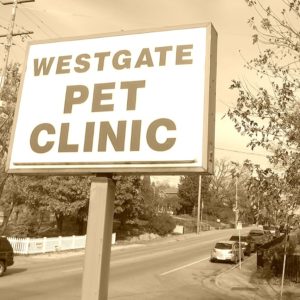
Dr. Teresa Hershey, a partner at Westgate Pet Clinic in Edina
There is no doubt we LOVE our pets. In fact, we think of them as not animals, but a genuine member of the family. Westgate Pet Clinic understands. They’ve been an institution in veterinary care in the Linden Hills neighborhood since 1973, but their roots go back 5 generations to the mid-1800’s – who better to trust with the care and treatment of your furry family member?
HISTORY
To understand where their passion for all animals comes from, it’s important to recognize their history, which dates back to the Civil War era. The legacy of Westgate Pet Clinic began when Thomas Porter moved his family to Minnesota in 1858; where he farmed, raised horses and became a “horse doctor” by trade (you didn’t need a degree to work with animals back then).

Westgate Pet Clinic has a long and rich local history
Thomas’s son, Bennett Porter, became the first official veterinarian in the family in 1906. Carrying on the tradition, Bennett’s ninth child, Bennett J. Porter I, become a veterinarian in 1931. He practiced in several locations across Minnesota before opening Porters Dog and Cat Hospital in St. Louis Park off of Highway 7. Dr Porter had three children, two of which also went on to become veterinarians. Dr Bennett Porter II founded Westgate Pet Clinic in 1973. The tradition continued when Bennett Porter III became a veterinarian in 1982 and subsequently purchased Westgate from his father in the mid-1990’s. Unfortunately, neither of Dr Bennett’s III children became veterinarians.
To further cement the legacy of Westgate Pet Clinic, Dr Porter III partnered with Dr Rhonda Downie in 2000 and under their management, grew the clinic from three doctors to ten. The two sold their practice to four of those associates, including Dr. Teresa Hershey; a year later, Dr Porter III retired from the practice.
KICKED IN THE FACE BY A PATIENT. OUCH
Dr. Hershey, much like Thomas and Bennett I, is rather familiar with horses and livestock – she became a mixed-animal veterinarian (specialized in treating all species of animals, both large and small) in Le Sueur, MN after being inspired by British author and veterinary surgeon James Harriot’s novels she read as a young adult. Being a large animal doctor definitely has it challenges – aside from the frequent midnight calf deliveries and emergency calls to the dairy farms, it can be very dangerous; some of these large animals can weigh up to 1,500 pounds! Dr Hershey recalled an incident where one of her workers was kicked in the face by a horse, suffering life-threatening injuries including 5 facial/skull fractures. She had also seen a horse fall on top of another coworker. After Dr. Hershey had a few close calls of her own – once she was nearly run over by a herd of cattle and another time she was stuck in an open field between a sick cow she was treating and a bull – narrowly escaping, she decided that perhaps large animals wasn’t the lifestyle she wanted after all. Following a couple short stints elsewhere, she made her way to Westgate where she took up special interests in geriatric pets as well as acupuncture.
Listen to the entire podcast here
WHAT MAKES A GOOD VET?
Being a good vet is more than just skills and education, you have like the patients (animals) and you have to like people, as well. Building a lasting, long-term relationship and being on the same page is key, especially as your pets’ age. Knowing that each unique breed of dog, for example, has its own life expectancy and aging challenges allows Dr Hershey to treat her geriatric patients effectively and respectfully.
Her geriatric patients happen to be her favorite – helping them age gracefully and comfortably. She takes great care in providing the appropriate treatments for her aging patients, which can include rehabilitative and mobility care. Rehabilitative care can include everything from dietary changes and supplements to exercises to acupuncture while mobility care can include everything from braces to slings for larger animals to help their owners lift them up stairs and wheelchairs.
ACUPUNCTURE AND DOGS
Interestingly, acupuncture has steadily been increasing in popularity in the animal (and human!) population because it is noninvasive, relatively reasonably priced and you can see results quickly (in as little as two treatments you can tell if it’s working). However, some animals will respond and some will not – so it isn’t as widely accepted as, say, an anti-inflammatory medication that has a proven, predictable outcome. Treatment options for our beloved animals, have certainly come a long way from the Civil War era!
No matter the breed or life expectancy of your furry family member, rest assured that Westgate Pet Clinic will remain a fixture in the veterinary community and will continue to provide trusted top-notch, cutting edge treatments and care – and because history has a way of repeating itself – likely for generations to come.




Leave a Reply